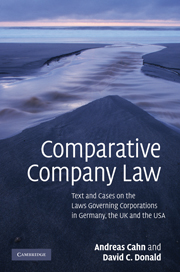 Comparative Company Law
Comparative Company Law from PART I - The essential qualities of the corporation
Required reading
EU: EC Treaty, arts. 43, 46, 48
UK: CA 2006, secs. 1046, 1049, 1052
US: DGCL, §§ 371, 383; California Corporations Code, § 2115
The dynamics of regulatory competition
The whole and its parts
The term “regulatory competition” refers to a competition that may arise between the laws or other rules (such as stock exchange rules) in different jurisdictions because of differences between the legal requirements for companies. Not all jurisdictions can compete with each other. Some are simply superior to and trump others (such as when the laws of a federal jurisdiction are superior to those of a state jurisdiction). In order to understand how “regulatory competition” has affected the three jurisdictions we address in this text, we must first understand what these jurisdictions are and the nature of their composition. Each is a sub-unit of a larger jurisdiction.
Germany and the UK belong to the EU, and all US states belong to the US. Because both the upper- and the lower-tier jurisdictions enact legislation that is or functions as company law, it is necessary to understand the nature of the rules coming from each jurisdiction and their respective standing vis-à-vis each other. The rule-giving bodies affecting the governance of public companies in each of our jurisdictions are found at the primary, nation or state level (i.e. Germany or Delaware), at an upper, supranational or national level (i.e. the EU or the US), and at the level of a private or quasi-public organization (e.g. the New York Stock Exchange or the UK Takeover Panel).
To save this book to your Kindle, first ensure no-reply@cambridge.org is added to your Approved Personal Document E-mail List under your Personal Document Settings on the Manage Your Content and Devices page of your Amazon account. Then enter the ‘name’ part of your Kindle email address below. Find out more about saving to your Kindle.
Note you can select to save to either the @free.kindle.com or @kindle.com variations. ‘@free.kindle.com’ emails are free but can only be saved to your device when it is connected to wi-fi. ‘@kindle.com’ emails can be delivered even when you are not connected to wi-fi, but note that service fees apply.
Find out more about the Kindle Personal Document Service.
To save content items to your account, please confirm that you agree to abide by our usage policies. If this is the first time you use this feature, you will be asked to authorise Cambridge Core to connect with your account. Find out more about saving content to Dropbox.
To save content items to your account, please confirm that you agree to abide by our usage policies. If this is the first time you use this feature, you will be asked to authorise Cambridge Core to connect with your account. Find out more about saving content to Google Drive.